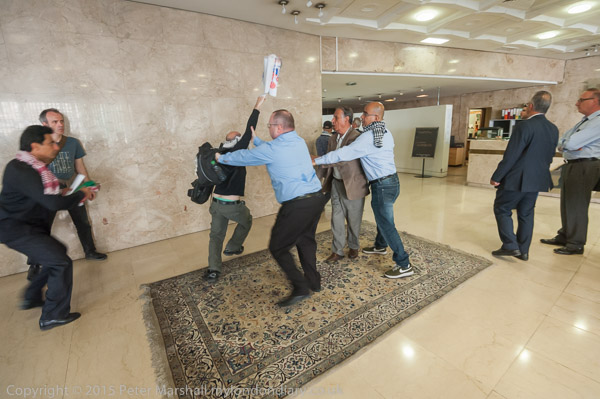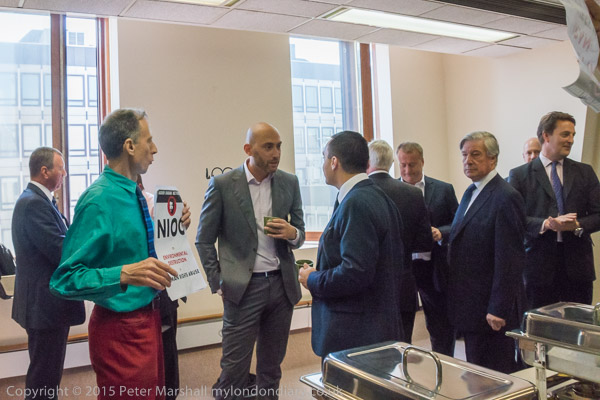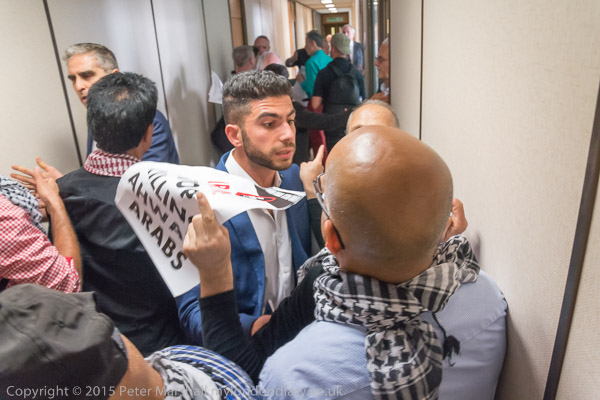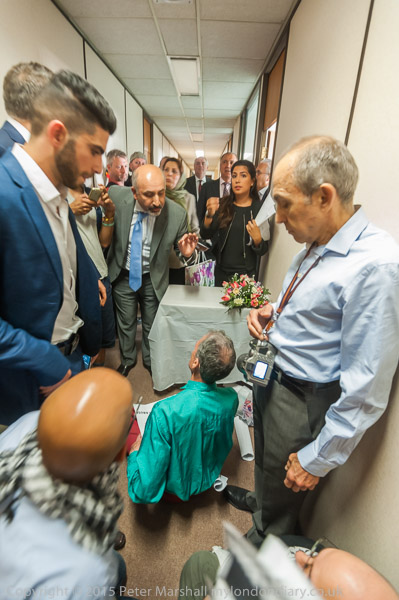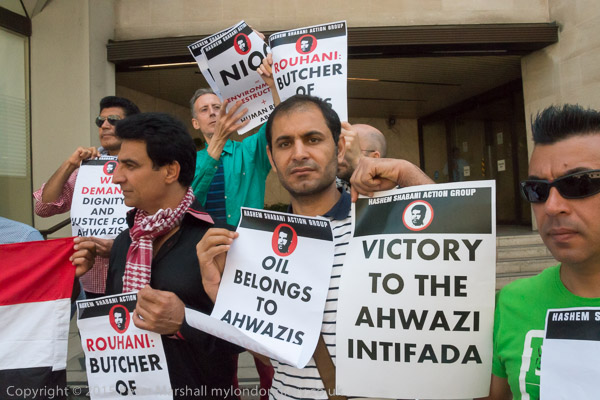Ahwazi Crash Secret UK-Iran Business Meeting: On Friday 3rd July 2015 I went into the offices of the British Iranian Chambers of Commerce (BICC) with a group of British-Iranian Ahwazi Arabs and human rights activist Peter Tatchell to gatecrash a secret meeting promoting UK-Iran trade and investment in NIOC (National Iranian Oil Company) House in Westminster.

Iran of course is very much back in the news now, following the attacks on its nuclear installions by Israel and the USA, concerned that Iran might be developing nuclear weapons. At the moment Israel is the only state in the Middle East with nuclear weapons and they and their US partners are very much concerned to keep it that way. But this protest was against the continuing savage oppression of the Awazi in Iran.
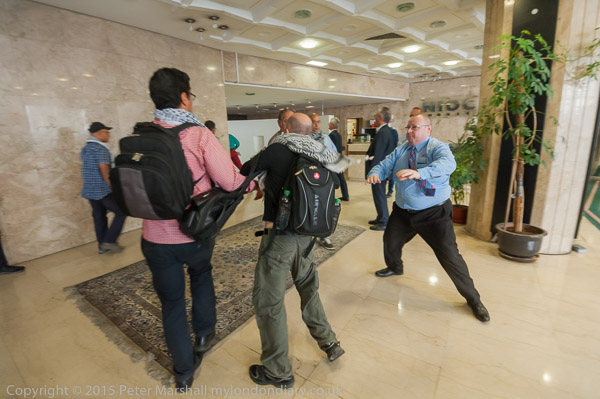
Iran is of course a state with a highly oppresive authoritarian religious regime – as Amnesty International report they surpress “the rights to freedom of expression, association and peaceful assembly” with “Women and girls, LGBTI people, and ethnic and religious minorities” experiencing “systemic discrimination and violence.”
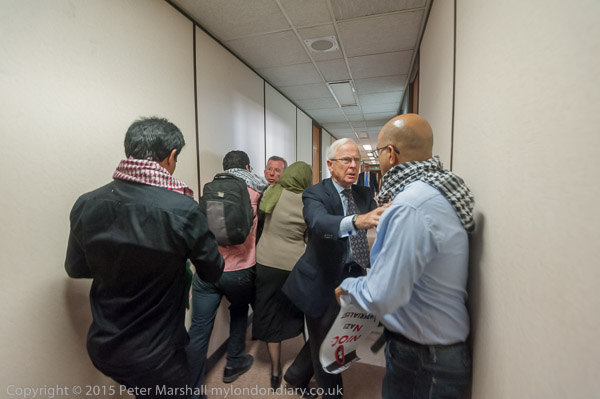
The Awazi Arabs are Iran’s largest Arab speaking community and their largely autonomous state of Al-Ahwaz was forcibly taken over by Persia in 1925. And they suffer more than any other ethnic group from Iranian oppression.
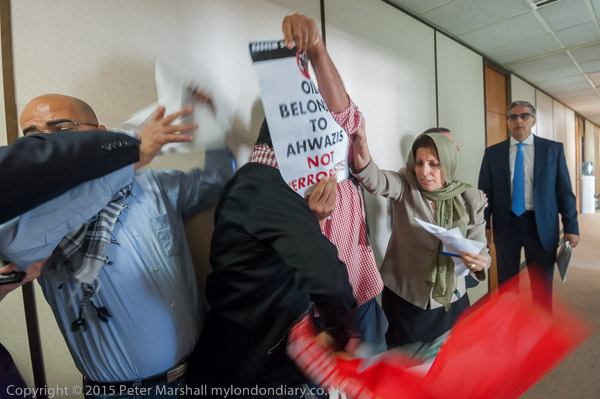
Oil was first discovered in Al-Ahwaz in 1908, and the Anglo-Persian Oil Company formed to exploit it (in was renamed the Anglo-Iranian Oil Company in 1935) was directly controlled by the British government from 1914 to 1951 when oil was nationalised under the the National Iranian Oil Company (NIOC.) Almost all of Iran’s oil is in the Ahwazi regions. Anglo-Iranian is now rather better known as BP.

Iranian violent persecution, forced displacement and the suppression of Ahwazi Arabs and their culture has continued since 1925, turning their homeland, thought to have been the inspiration of the Biblical ‘Garden of Eden’ into a a desolate wasteland, the poorest area of the Middle East.

A recent Facebook post gives a short clear summary of Iran’s history – here’s the text:
“IRAN ONCE HAD DEMOCRACY – THE WEST DESTROYED IT.
Every time Western leaders talk about “freedom and democracy” in Iran – they either don’t know history – or they’re hoping you don’t.IRAN HAD DEMOCRACY – Until the CIA and MI6 overthrew it. Why? Because Iran dared to nationalize its own oil. That was 1953. The elected Prime Minister, Mohammad Mossadegh, was toppled by Operation Ajax. Why? Because British Petroleum (yes, that BP) didn’t want to lose control.
So let’s stop pretending the West ever cared about the Iranian people.
It was always about oil and imperial control. And those parroting “freedom” today – without this context – are sadly, useful idiots for empire.”
The post goes on to promote the book “The Devil’s Chessboard” by David Talbot, founding editor of Salon, which apparently “tells the full story” of how the “Dulles brothers weaponized the CIA to crush democracy abroad – from Iran to Congo to Guatemala” though I’ve not read it.
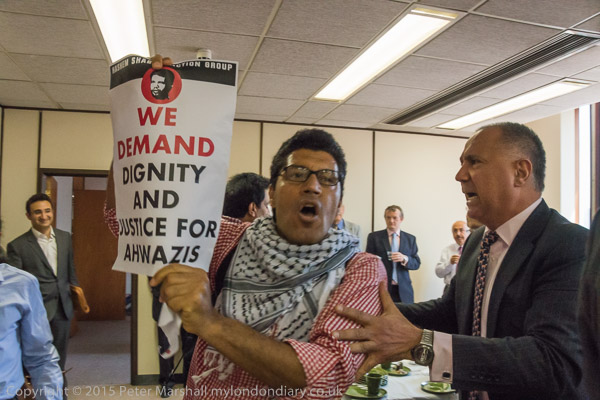
You can read more about what happened inside NIOC House on My London Diary, though I think the pictures and captions give a good idea there are many more there. I had some difficult in working in the low lighting in the corridor and from some trying to stop me taking pictures, but was not seriously harrassed, though I was stopped and wasn’t able to get a picture of Lord Lamont as he was confronted by some of the protesters, although the other photographers did.

One man – recognised by the protesters as an Iranian Embassy official – began to assault one of the photographers but was restrained by others from the meeting. After ten minutes the protesters decided they had make their point and we all made our way down to the foyer. Here we were met by police who stopped us leaving.

While we were not arrested we were prevented from leaving for over 45 minutes, although I and the other journalists all showed our press cards. It was hot and I was pleased to drink some of the cold fruit juice the building manager hospitably offered. The photographer who had been assaulted complained to the police before went up to the sixth floor – when they came down he was told his assailant might have diplomatic immunity and the photographer decided not to press charges.

Eventually all of us were released, presumably as the BICC wished to avoid publicity about their meeting. The protesters including some who had stayed outside the building then posed on the steps for photographs.
More on My London Diary at Ahwazi crash secret UK-Iran business meeting.
Flickr – Facebook – My London Diary – Hull Photos – Lea Valley – Paris
London’s Industrial Heritage – London Photos
All photographs on this page are copyright © Peter Marshall.
Contact me to buy prints or licence to reproduce.
